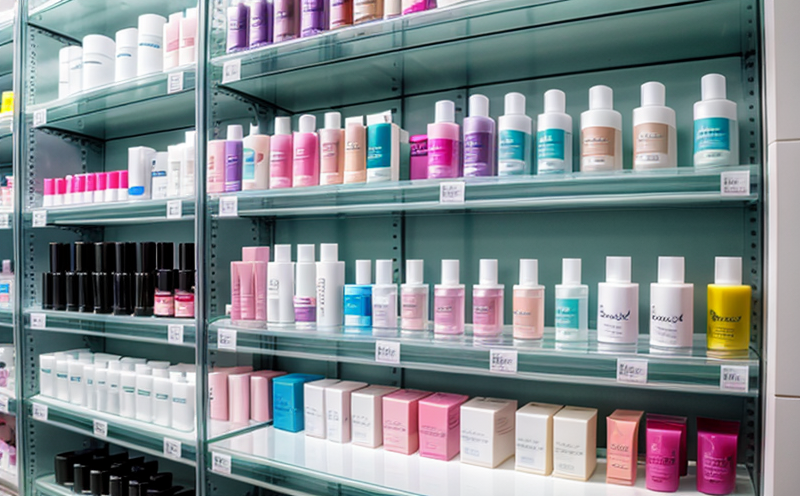Rheology Stability Testing of Cosmetic Gels
The rheological stability testing of cosmetic gels is a critical process in ensuring that formulations remain stable over time and under various conditions. This service involves the comprehensive evaluation of gel-like cosmetic products to predict their potential changes in texture, consistency, and overall quality during storage and use. The primary goal is to ensure compliance with regulatory standards while enhancing product performance and consumer satisfaction.
Rheological stability testing addresses a range of factors including shear thinning behavior, viscoelastic properties, and thixotropy. These characteristics are essential for maintaining the desired texture and application ease of cosmetic gels. The service includes detailed analysis using advanced rheological equipment to simulate real-world conditions that may affect the product's integrity.
During the testing process, samples undergo a series of procedures designed to mimic storage environments such as temperature variations, humidity fluctuations, and exposure to light. This helps in identifying any potential changes in the gel structure that could lead to degradation or loss of functionality. The data collected is then used to evaluate the product's stability over time, ensuring it meets both internal quality standards and external regulatory requirements.
The importance of rheological testing cannot be overstated, especially for cosmetic gels which are often highly complex systems with multiple ingredients contributing to their unique properties. By understanding how these formulations behave under different conditions, manufacturers can make informed decisions about ingredient selection, formulation design, and packaging materials. This ultimately leads to more robust products that deliver consistent performance throughout their shelf life.
One of the key aspects of this testing is the ability to predict long-term stability through accelerated aging tests. These tests allow for the simulation of extended periods of exposure to adverse conditions within a controlled laboratory setting. Such insights are invaluable in ensuring that products not only pass short-term quality checks but also maintain their integrity over longer durations, thereby building trust with consumers and meeting market expectations.
Another critical factor is the role of rheology in formulating aesthetically pleasing products. The texture and consistency of cosmetic gels play a significant role in consumer acceptance, so it's important to have accurate measurements that reflect both short-term and long-term behavior accurately. Accurate rheological testing provides this level of precision by providing detailed insights into how changes in formulation could impact final product characteristics.
Ultimately, rheology stability testing is about more than just passing regulatory requirements; it’s about delivering superior products that exceed customer expectations consistently. By leveraging advanced techniques and robust data analysis, we offer a comprehensive service aimed at enhancing the quality of cosmetic gels, ensuring they remain stable and effective over extended periods.
Scope and Methodology
| Test Parameter | Description |
|---|---|
| Rheological Measurement | Use of rotational rheometers to measure shear viscosity, yield stress, and other relevant parameters. |
| Temperature Cycling | Simulating storage conditions through repeated temperature changes. |
| Humidity Exposure | Testing the effect of humidity on gel stability over time. |
| Light Exposure | Evaluating the impact of light exposure on chemical and physical properties. |
| Shear Thinning Behavior | Determining how quickly a gel flows under shear stress over time. |
| Viscoelastic Properties | Assessing the elastic and viscous components of the gel’s response to deformation. |
| Thixotropy | Evaluating the time-dependent change in viscosity under shear stress. |
International Acceptance and Recognition
The rheology stability testing of cosmetic gels is widely recognized internationally as a crucial aspect of ensuring product quality and safety. Regulatory bodies such as the United States Food and Drug Administration (FDA), European Cosmetics Regulation, and other global standards all emphasize the importance of this type of testing.
International standards like ISO 8297:2016 and ASTM D5436 provide guidelines for conducting rheological measurements on cosmetic products. These standards ensure that tests are performed consistently across different laboratories around the world, enhancing comparability and reliability of results.
The widespread acceptance of these methods is driven by their ability to accurately predict how cosmetic gels will behave under real-world conditions. This not only helps manufacturers comply with regulatory requirements but also enhances consumer confidence in products that have been rigorously tested for stability and safety.
Moreover, the recognition of rheological testing extends beyond just compliance; it plays a vital role in innovation within the cosmetics industry. By adhering to these international standards, companies can develop formulations that not only meet regulatory expectations but also stand out in competitive markets by offering superior performance and longevity.
Competitive Advantage and Market Impact
In today’s highly competitive market, ensuring the stability of cosmetic gels is more than just a compliance issue; it's a strategic imperative. Companies that invest in thorough rheological testing gain significant advantages over their competitors.
Firstly, these tests provide invaluable data on how products will perform under various environmental conditions, allowing manufacturers to make informed decisions about ingredient selection and formulation design. This leads to more robust products that are less likely to degrade or change during storage, enhancing brand reputation and customer satisfaction.
Secondly, compliance with international standards such as ISO 8297:2016 and ASTM D5436 not only ensures legal adherence but also positions companies favorably in the eyes of regulators. This can open up new market opportunities and facilitate smoother interactions with regulatory bodies.
Furthermore, the ability to predict long-term stability through accelerated aging tests gives companies a competitive edge by ensuring that their products meet high-quality standards even before they reach retail shelves. This not only builds trust with consumers but also helps in maintaining consistent product quality across different regions and climates.
In conclusion, rheology stability testing is a cornerstone of modern cosmetic manufacturing. It provides essential insights into product behavior under real-world conditions, supports regulatory compliance, fosters innovation, and enhances market competitiveness. By embracing this service, companies can ensure that their products are not only safe but also effective and appealing to consumers.





